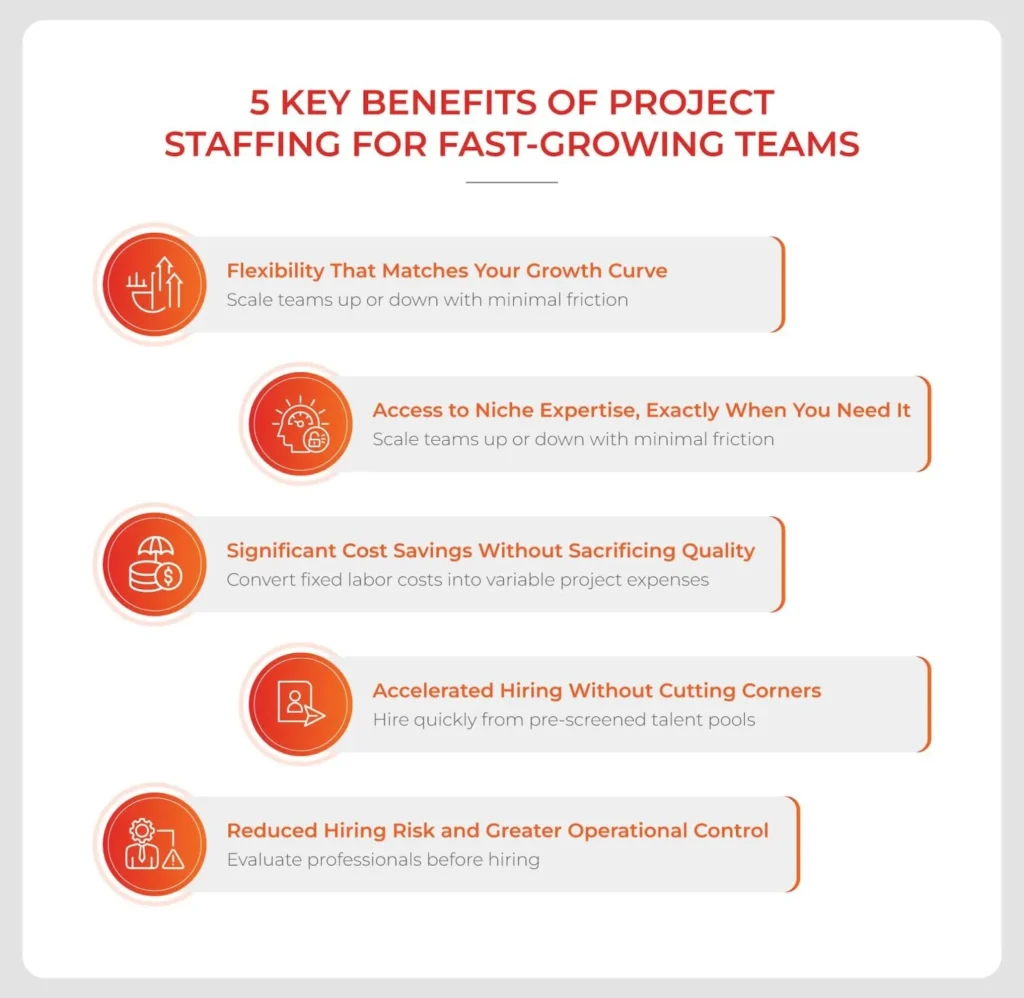Project staffing is a workforce strategy that helps companies hire project-based recruiting and staffing services to quickly fill short-term, specialized roles aligned with specific business goals.
When your team’s growing fast, so are the demands and the talent gaps. It’s not about hiring more people; it’s about finding the right people, right when you need them. Traditional hiring cannot always keep up with the dynamic nature of high-growth environments. That’s why more and more HR leaders are leaning towards project staffing. It’s agile, efficient, and tailored for situations where speed and skill matter most.
What is Project Staffing?
Project staffing is a strategic approach to hiring that brings in professionals on a temporary basis to help organizations meet specific project goals. These roles often call for sophisticated, sometimes niche expertise, and they’re focused on short-term, results-driven outcomes.
The idea is simple: fill real skill gaps with experts who can hit the ground running and make an immediate impact.
We’re talking product launches, tech upgrades, and compliance deadlines—critical projects where the clock is ticking and the stakes are high.
Why Fast-Growing Teams Choose Project Staffing
Fast-growing teams are constantly under pressure, managing tight deadlines, shifting priorities and high-impact deliverables. In such an environment, there is no room for lengthy hiring cycles. Project-based recruitment delivers speed and flexibility, bridging the gap between rapid growth and limited hiring bandwidth.
At SPECTRAFORCE, we believe that project-based staffing services allow teams to plug critical skill gaps, maintain operational momentum, and stay cost-efficient without the long-term commitment of full-time hires.
The result?
Agility, specialization, and risk management, all in one smart move.
5 Key Benefits of Project Staffing
Below are the top benefits of project staffing for fast-growing teams:
1. Flexibility that matches your growth curve
Organizational growth rarely follows a straight line. Project demands fluctuate, team bandwidth shifts, and resource allocation needs to remain fluid.
Project staffing gives HR leaders the flexibility to scale teams up or down with minimal friction.
This flexibility isn’t just about adjusting headcount but about timing. When market conditions change or when leadership pivots mid-quarter, having ready-to-deploy resources in place means your team can respond quickly and with precision.
It also eliminates the risk of overhiring for a temporary spike in demand.

2. Access to niche expertise, exactly when you need it
Specialized projects like cloud migration, regulatory sprints, or ERP upgrades often require skillsets that aren’t available in-house, and likely shouldn’t be long-term.
Project-based recruitment brings in the exact expertise your team needs, right when you need it. You’re not building permanent verticals but assembling a high-performance task force.
With project solutions, companies gain access to curated, pre-vetted professionals who’ve the expertise and the experience, often across industries. There’s no learning curve, just execution.
We recently supported Salesforce during a high-pressure, end-of-year push to uplift their Enterprise Data Hub. Facing tight deadlines and needing immediate, specialized talent, they turned to SPECTRAFORCE to assemble a focused team, including a Tableau engineer, a Snowflake admin, and a product owner, all within weeks.
The results spoke for themselves: the project was delivered on time, dashboards were optimized, Snowflake usage was streamlined, and Salesforce reported saving over $30K in operational costs. It’s a clear example of how project-based staffing delivers not just people, but precision, speed, and measurable outcomes.
3. Cost efficiency without compromising on quality
Hiring full-time talent comes with a long tail of overheads: benefits, training, onboarding time, and opportunity cost. And when roles are short-term by nature, those investments can be hard to justify.
Project-based recruitment minimizes that spend. You pay for the expertise only when you need it. And because the onboarding curve is short, productivity starts sooner, maximizing ROI from day one.
Project-based staffing services save money and optimize spending by letting you shift fixed costs to variable ones, aligning workforce investments with actual business needs, not assumptions or projections.
4. Accelerated hiring without cutting corners
Project staffing solutions eliminate the need to trade off between quality and speed. These services are built on curated talent pools and pre-screened candidates, allowing organizations to hire in days (not weeks) without sacrificing fit or performance.
This speed is crucial for initiatives like new product launches, M&A integrations, or enterprise tech upgrades—projects where delay costs are measured in lost revenue or missed opportunities.
Faster hiring means faster execution, and that momentum matters.
5. Reduced hiring risk and greater operational control
One of the biggest advantages of project solutions is reduced hiring risk. You get to work with top-tier professionals and evaluate them in action before making any long-term commitments.
It’s essentially a working interview, but one where real business value is created in the process. This model is especially effective in high-stakes or high-ambiguity environments where performance and adaptability are non-negotiable.
You gain greater operational control while sidestepping the legal and logistical complexities that often accompany full-time employment contracts.
From a compliance standpoint, it also allows for cleaner exits and smoother transitions when projects conclude.
When to Hire Project-Based Staffing Services
There are specific inflection points in every organization’s growth journey when agility matters more than anything else. That’s when you need project staffing to gain a strategic advantage.
- High-Growth Phases: Rapid expansion often outpaces internal recruitment capacity. Project-based staffing helps maintain delivery timelines without overburdening internal teams.
- New Product Launches: Product development cycles demand specialized roles like UX strategists, compliance experts, or tech consultants that aren’t always needed post-launch.
- Seasonal Demand Surges: Businesses in sectors like retail, healthcare, and logistics turn to project staffing during peak periods to meet short-term demands efficiently. In fact, Deloitte’s Global Human Capital Trends report highlights how businesses are turning to more agile staffing models during seasonal demand surges to remain lean and responsive.
The Bottom Line?
Project-based recruitment is not just a hiring strategy but a growth enabler too.
It is often treated as a workaround, a stopgap when traditional hiring can’t keep pace. But for companies scaling fast, it’s a competitive advantage.
It drives focused execution without the operational drag. It reduces hiring friction, shortens time-to-value, and unlocks access to top-tier talent that traditional recruitment cycles rarely reach.
More importantly, it signals a shift in how modern organizations approach workforce planning—not as a static headcount exercise but as a dynamic, demand-driven strategy, built for agility, impact, and growth.
Ready to move fast and stay in control? SPECTRAFORCE offers solutions designed to keep your business ahead of the curve. Explore project staffing solutions here.
FAQs
Project staffing is vastly different from freelance hiring or temp staffing. While freelance and temp hiring focus on task-based or short-term coverage, project staffing is strategic. It’s outcome-oriented and designed to bring in specialized professionals for defined, high-impact business projects.
Unlike freelancing, project staffing involves alignment with broader team workflows, compliance requirements, and operational KPIs.
Project solutions are ideal for roles that require specialized expertise, short-term focus, and fast execution. Common functions include IT and tech (e.g., cloud migration, cybersecurity, software development), finance (e.g., audits, M&A support), compliance, marketing (e.g., product launches, rebranding), HR (e.g., DEI initiatives, system implementations), and operations (e.g., supply chain optimization, process improvement). These roles often support high-impact initiatives where delays are costly and full-time hires aren’t practical.
Yes, project staffing can fit into an organization’s long-term workforce strategy. Many companies now use a blended workforce strategy that combines permanent hires with project-based staff.
This model increases agility, optimizes cost, and gives HR leaders more control over capability deployment across changing business cycles.
Yes, compliance can be a concern when working with project-based staffing services. However, trusted project-based staffing services such as SPECTRAFORCE manage compliance for you. They handle worker classification, contracts, and legal requirements to minimize risk. This helps avoid misclassification, tax issues, and co-employment concerns, making sure your projects stay both agile and compliant.



